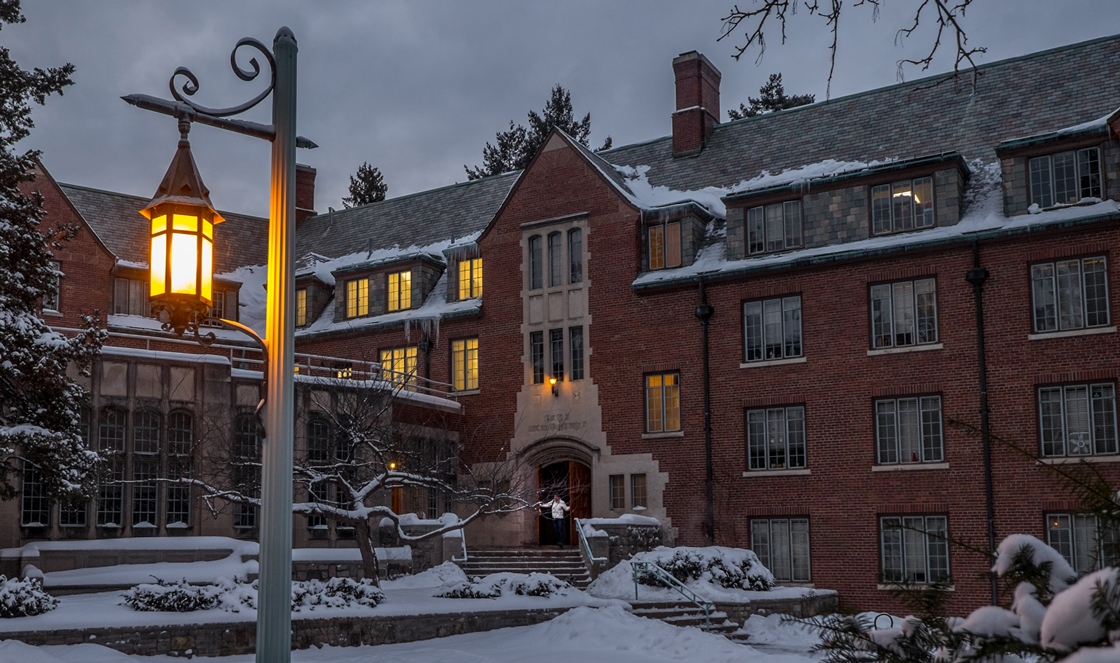October 2012
Kelly Dumais has won a poster award at the annual symposium of the Center for Neuroendocrine Studies which took place at the University of Massachusetts on Oct 26, in Amherst, MA. Congrats Kelly! Caroline Smith, Jazmin Mogavero, Andrea Alonso, and Alexa Veenema also attended this symposium.
October 2012
Remco Bredewold and Alexa Veenema presented a poster about their research during the annual meeting of the Society for Neuroscience which took place on October 13-17, in New Orleans, LA.
July 2012
Alexa Veenema was invited as symposium speaker during the biannual meeting of the International Society for Research on Aggression (ISRA) on July 17-21, in Luxembourg, to present findings of the lab that show that the quality of the early life social environment determines differential expression of juvenile and adult aggressive behaviors which are linked to changes in vasopressin and oxytocin systems.
June 2012
Kelly Dumais (first photo below), Caroline Smith (second photo below), Remco Bredewold, and Alexa Veenema presented posters about their research during the annual meeting of the Society for Behavioral Neuroendocrinology which took place on June 15-18, in Madison, WI.
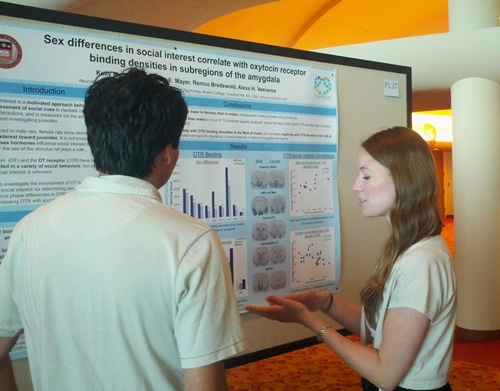

June 2012
 Jazmin Mogavero and Danielle Scaramella are supported by BC Undergraduate Research Fellowships, which allows them to do full-time research over the summer. Jazmin is studying the involvement of neuropeptides in social novelty-seeking in rats and Danielle is studying the role of oxytocin in juvenile play-fighting in rats.
Jazmin Mogavero and Danielle Scaramella are supported by BC Undergraduate Research Fellowships, which allows them to do full-time research over the summer. Jazmin is studying the involvement of neuropeptides in social novelty-seeking in rats and Danielle is studying the role of oxytocin in juvenile play-fighting in rats.
May 2012
Alexa Veenema was invited as symposium speaker during the annual meeting of the IBANGS on May 15-19, in Boulder, CO to present findings of the lab that show that early-life adverse social interactions in rats alter the expression of social and emotional behaviors.
May 2012
Caroline Smith and Kelly Dumais gave a talk about their research projects during the Graduate Research Day at the Department of Psychology.

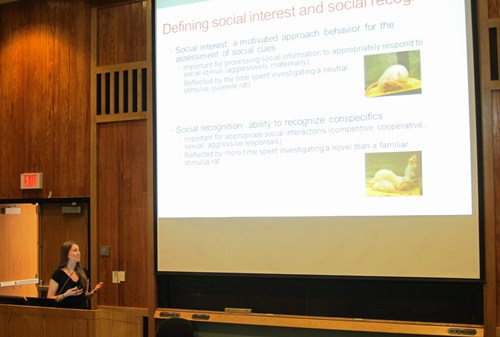
May 2012
Tom Mayer and Jazmin Mogavero presented a poster about their research projects during the Psychology Undergraduate Research Conference.
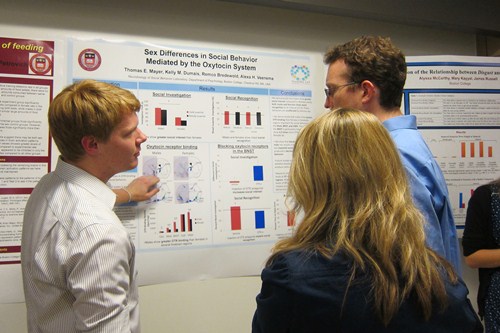
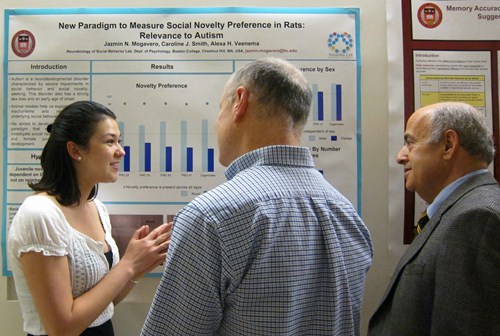
April 2012
Kelly Dumais’ Master of Science Defense. On the photo, Kelly and the Promotion Committee consisting of Profs. Michael Numan, Gorica Petrovich, and Alexa Veenema.
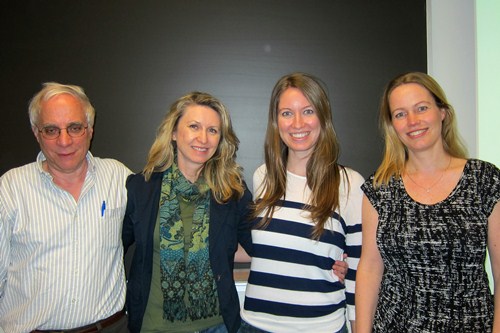
April 2012
 Caroline Smith has been awarded a National Science Foundation Graduate Research Fellowship for her research on the neural mechanisms regulating social novelty-seeking. Several human social disorders are characterized by impaired social novelty-seeking, like autism. However, the neural mechanisms underlying social novelty-seeking are poorly understood. Caroline has developed a new behavioral test to study, for the first time, the neural network that mediates social novelty-seeking and the role of vasopressin and oxytocin in this network.Congratulations Caroline!!
Caroline Smith has been awarded a National Science Foundation Graduate Research Fellowship for her research on the neural mechanisms regulating social novelty-seeking. Several human social disorders are characterized by impaired social novelty-seeking, like autism. However, the neural mechanisms underlying social novelty-seeking are poorly understood. Caroline has developed a new behavioral test to study, for the first time, the neural network that mediates social novelty-seeking and the role of vasopressin and oxytocin in this network.Congratulations Caroline!!
January 2012
Research article: Vasopressin regulates social recognition in sex- and age-specific ways. The neuropeptide vasopressin is synthesized and released in the brain and is known to facilitate social recognition (the ability to discriminate between familiar and unfamiliar individuals) in male rodents (Dantzer et al., 1988; Engelmann & Landgraf,1994; Everts & Koolhaas, 1997; Landgraf et al., 2003; Bielsky et al., 2004, 2005) and in male human subjects (Zink et al., 2011). Importantly, males have more vasopressin than females and adults have more vasopressin than juveniles. We therefore hypothesized that vasopressin regulates social recognition in sex- and age-specific ways. However, we found that blocking vasopressin receptors in the lateral septum, a brain area involved in social recognition, impaired, while vasopressin extended, social recognition in both adult males and females. In contrast, blocking vasopressin receptors in the lateral septum did not impair social recognition in juvenile males and females. Moreover, vasopressin facilitated social recognition in juvenile females but not in juvenile males. Overall, these findings suggest that (i) vasopressin is an important regulator of social recognition in both sexes in adulthood, (ii) vasopressin shows sex-specific regulation of social recognition only at juvenile age, and (iii) vasopressin regulates social recognition in an age-specific manner. We currently are investigating underlying mechanisms. This research was funded by the German Research Foundation (VE453/4-1; Alexa Veenema) and NSF (IBN-9421658; Geert de Vries) and NIMH (RO1-MH047538; Geert de Vries).
